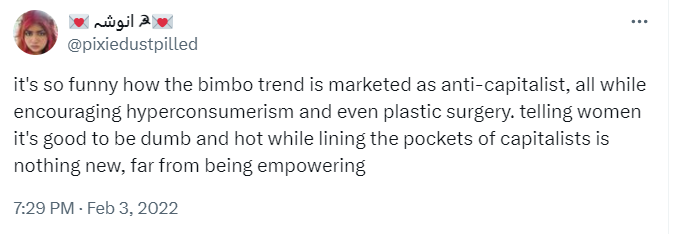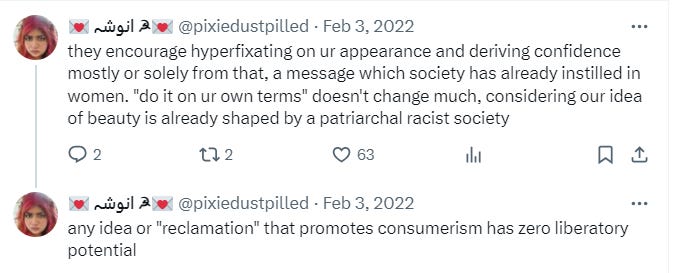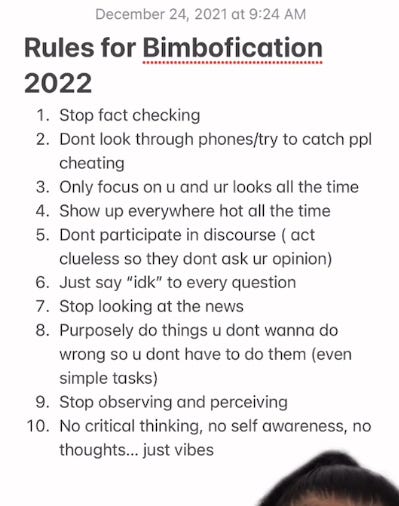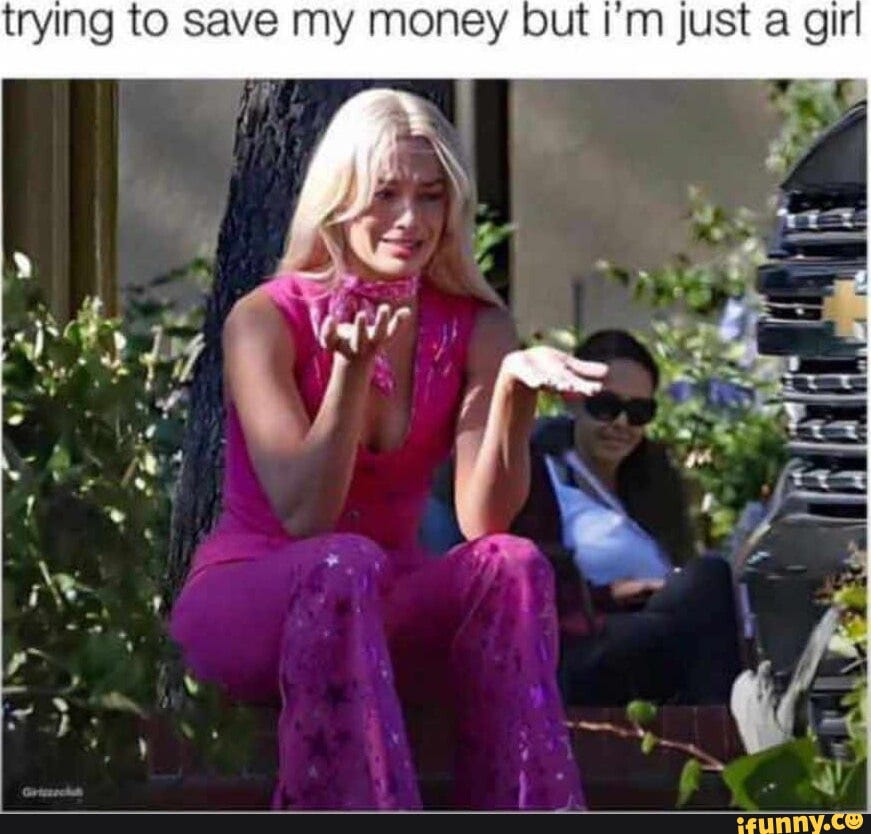part of my undergraduate dissertation explored the nihilism of the bimbo feminist and dissociative feminist archetypes through poetry. this essay expands on the research i undertook for the essay portion of my project, and explains my feelings on the subject. it is by no means a complete encyclopaedia of bimbo feminism, but is instead intended to start a conversation. please do not send any derogatory messages to anyone mentioned, and if you comment please maintain a respectful atmosphere. i may get heated during this piece but i don’t intend to be cruel to anybody and you shouldn’t either. thank you.
it’s been three years since the rise of bimbo feminism on tiktok, which means for about two and a half years i have had some iteration of this essay bouncing around my brain like a pinball. my disdain for the bimbo feminists is so severe that before i had a substack account - and actually, before i had any plans to make one - i had an itch to write about them, to incise and drain their ideology like an infected wound, because that is what i believe them to be. perhaps i’m just feeling particularly mean-spirited this week, but i lose a little respect for everyone who calls themselves a bimbo.
although the distinct style of bimboism rose to prominence on tiktok in 2021, it hit the mainstream in the ‘barbie summer’ of 2023, which is ironic because barbie and the bimbo have little in common other than their penchant for hot pink clothing. barbie is aspirational - she’s had more than two hundred careers - while the bimbo is famously anti-work. this is not out of anti-capitalist beliefs (well, not always) but out of a desire to live a smooth, streamlined, effortless existence; her aspirations often climb no further than the search for the perfect lip liner.
if you haven’t encountered a bimbo feminist in the wild as of yet, i envy your social media experience. but allow me to explain:
the twenty-first century bimbo (ignoring the ‘feminist’ aspect for now) is characterised by hyperfeminine qualities like platinum blonde or dyed pink hair, heavy makeup, and revealing clothing made with textures such as fur, latex and lace. behaviourally, she speaks with a slow, sultry drawl, and celebrates her sexuality. she is not modest or timid; she is shrill, she is fun, she’s so crazy you can’t take her anywhere. in many ways she is an evolution of the ‘dumb blonde’ trope for the internet age.
the figure was popularised by social media creators like chrissy chlapecka and nikita redkar, who are supposedly reclaiming stereotypes of women as unintelligent, shallow and promiscuous by playing them up with a level of irony - the irony being that it’s funny to pretend you’re stupid when you’re smart. since the rise of this style of creators, slogans such as ‘hot girls can’t drive,’ ‘girl dinner,’ and ‘i’m just a girl’ have propagated like the spores of a huge unassailable fungus which aims to reduce all women to the role of helpless and malnourished fawns. they seem innocent enough, accompanied by images of baby animals and bows, or sometimes baby animals wearing bows, but over time they’re internalised, and it’s not long before ‘i’m just a girl’ becomes a knee-jerk response to any inconvenience or mistake. ‘i’m just a girl, of course i don’t know how taxes work.’ ‘i’m just a girl, of course i don’t eat carbs.’ in the wake of this culture of incompetence, i find myself asking two major questions:
1) at what point does harmless fun become infantilising and regressive?
2) how do we always manage to find it?
one of the major issues that arises out of this social media phenomenon is that although many supporters of the bimbo feminist movement claim to be operating within a bubble of irony, they speak about deeply serious political issues such as reproductive rights, lgbt rights and black lives matter, which muddies the water between satire and sincerity. these creators expect us to decipher which statements fall under which persona, despite using the exact same tone of voice, expression and visual cues for each one. i like to call this schrödinger’s satire, because it’s a cheap excuse for creators whose poorly-considered content falls flat in the face of criticism. not only does the conflation between ‘stupid woman’ and ‘leftist ideology’ paint a grim picture of the left being a melting pot for the ignorant and the lazy, it does little in the way of mocking men either. whether men fetishise or denigrate bimbofication, they’re probably not going to suddenly reflect on their inner biases once they find out the woman on the screen has a master’s degree. nicole jones of the critic put it best in 2022, stating that the bimbo movement actually just caters to patriarchal ideals: ‘a man who views women as intellectually inferior sex objects is unlikely to care whether or not the performance is ironic.’1
a major example of this style of schrödinger’s satire is found in the ‘bimbo manifesto’ of 2021. in hindsight, nobody should have paid any mind this as its creator was only nineteen, but it sparked enough discussion that buzzfeed wrote about it.2 fiona fairbairn, known as @gsgetlonelytoo on tiktok, posted this video in december 2021, which is a completely insane list of rules for a year of bimbofication. according to buzzfeed, fairbairn clarified that her interpretation of bimbofication meant adopting a carefree attitude towards life in the pursuit of happiness and refusing to waste energy on criticism - but this has nothing to do with the first point of the manifesto, which is ‘stop fact checking.’ although this video is a couple of years old now, it still irritates me, and buzzfeed’s uncritical nodding along to it irritates me even more.
other critics also argue that bimbo feminism is relatively unhelpful in comparison to earlier iterations of women-led movements. sophie elliott of harbingers’ magazine states that ‘the bimbo label capitalises on polemics by satisfying the male gaze while […] reclaiming [its] image through subversive politics’ and that bimboism ‘ascribes a narrowly defined appearance to successful female liberation.’ elliott makes a very strong point when she argues that bimbos satisfy the male gaze - after all, a lot of them advocate for plastic surgery and other cosmetic procedures using hashtags like #plasticpositive, subject themselves to injuries by walking around in stilettos, or push their breasts up so far they risk giving themselves a black eye. in more extreme and fetishistic cases, they cite their aims to look like blow-up dolls. whether or not they are attracted to men, they’ve stopped to think about the implications of their behaviour, they are contributing to a culture of fetishisation and condescension.
when i told my friend rebecca i was writing this essay, she provided an excellent point, specifically about the promiscuity of the bimbo archetype:
‘i think they have completely tarnished the phrase “sexual liberation” [and] they’ve managed to centre a feminist movement around men […] no matter how much we try to convince ourselves we gain from hookup culture, it is still feeding into what men desire the most […] i also think it has bred the most insecure, male-centred generation of women and slapped a neon pink label on it.’
i think the ‘neon pink label’ summarises the entire condition of the bimbo. there are very real and deeply insidious real-world factors at play that leave women feeling helpless over their self-image and hoping to regain some control in the eyes of the men who hate them. misogynistic violence is on the rise, especially in the uk, and the manosphere insists that all women are stupid and worthless anyway, so some of them are bound to internalise it.3 but if all this pain can be packaged in something so pretty, maybe it will hurt a little less.
despite the bimbos attempting to convince the world their heads are full of cotton wool, we know that’s not the case. emmeline clein argues that the driving force behind the bimbo resurgence is not necessarily all to do with recontextualising misogynistic stereotypes or reclaiming power, but instead originates from a place of deep, dark nihilism: ‘society is fucked and therefore, so is my life, and i wish i were too dumb to notice.’4 it’s easy to see why people might resort to this line of thinking. to become a bimbo is to accept that men are going to objectify you, overlook or completely deny your intellectual capabilities, and to absolve yourself of all obligation to change their minds. society is fucked, but we are noticing, and we are maddeningly powerless to evoke real change. thus, by becoming a bimbo, a woman offers submission to the patriarchy but uses the language of the oppressor to feel a slight tug of control.
perhaps the most infuriating aspect of the bimbo resurgence is how prominent its anti-intellectual qualities are across the internet, which seeps into real life in the form of our slang. even if someone doesn’t know what a modern day bimbo is, even if the only images that spring to mind are trisha paytas or paris hilton circa 2004, they’ve probably encountered some iteration of the ‘i’m just a girl’ meme. so many of these jokes set their punchline somewhere in the realm of:
a) ‘women be shopping’
b) ‘women be crazy’
c) ‘women be stupid’
and forgive me if this makes me a toxic, joyless, bad vibes person who can’t take a joke, but i really don’t see what’s so funny about women reinforcing the same misogynistic jokes that have been used to diminish us since what feels like the beginning of time. this becomes especially insidious when these jokes seep into real-world psychology, and people begin spending ridiculous amounts of money on products and services they can’t afford because that’s their entire scope of femininity. and don’t get me started on the bioessentialists who claim to be entirely ruled by their menstrual cycle to such a ridiculous point that it’s fundamentally identical to ‘women are too hormonal to be trusted with any task that requires logical thinking.’
i just don’t think it’s progressive to rebrand traditional misogynistic stereotypes with little satin ribbons and declare that womanhood is intrinsically linked to frivolity, financial irresponsibility (this is a big one) and being completely dependent on others. i definitely don’t think it’s progressive to suggest that young women should reject literacy and education in the pursuit of beauty, seeing as education is ‘globally recognised as the solution to ending the cycle of poverty.’5 it’s a tale as old as time - wealthy, privileged (and often white) women swan around calling themselves ‘dumb whores’ in the name of feminism, while millions of women around the world are withheld from the education system as a tool of suppression. the whole system is pathetic.
all in all, bimbo feminism is part of a much larger wave of anti-intellectualism and undisputed ignorance across the internet. not only does it tap in to the fetish market, it demands the celebration of objectification, which lines up hand in hand with the current wave of anti-feminist, regressive ‘tradwife’ content plaguing the internet. not only that, it correlates to the rise in less gender-specific waves such as the chatgpt boom that holds dire consequences for the future of the quality of education. there’s no doubt about it - people are getting stupid and they’re getting lazy. and maybe i’m too woke or take myself too seriously, but this is a trend i vow to never be part of.
nicole jones, the rise of the bimbo (2022) https://thecritic.co.uk/the-rise-of-the-bimbo/
pernell quilon, this woman went viral for creating a ‘bimbo manifesto,’ and honestly, it’s a work of art (2022) https://www.buzzfeed.com/pernellquilon/tiktok-bimbo-manifesto (it’s very interesting to me that this was written by a man)
npcc, call to action as vawg epidemic deepens (2023) https://news.npcc.police.uk/releases/call-to-action-as-violence-against-women-and-girls-epidemic-deepens-1
emmeline clein, on bimbos and tradwives (2023) https://majusculelit.com/on-bimbos-and-tradwives/
tess lowery, education saves lives. no, really, it does. here’s why. https://www.globalcitizen.org/en/content/education-health-link-poverty/








You‘ve basically already said it in better ways, but I truly think bimbo feminism, similar to girlboss feminism, is built on the idea that you can cheat the system (capitalist patriarchy) while operating within it/complying with it. Which is a fallacy to begin with.
Let's break this down because I fundamentally did not agree with anything you said:
“The bimbo feminists will pay for their crimes”
This title is supposed to what, hold hyper feminine women accountable for the crimes of men?
In the epilogue you introduce your intentions by saying “…I may get heated during this piece but i don’t intend to be cruel to anybody…”
Then quite literally a paragraph underneath it say, “my disdain for the bimbo feminists is so severe… I had an itch to write about them, to incise and drain their ideology like an infected wound, because that is what I believe them to be.”
You began this essay with biased and harmful beliefs that demean a group of women, granted not a popularized feminist group, but still women.
Are we not all fighting the same fight? That we deserve to be treated equally and respectfully; not deemed to be acceptable or appropriate by anyone but ourselves.. or does that only apply to women who reject femininity, break other women down or get ahead in a capitalist environment?
You then go on to say, “the twenty-first century bimbo (ignoring the ‘feminist’ aspect for now) is characterised by hyperfeminine qualities like platinum blonde or dyed pink hair, heavy makeup, and revealing clothing made with textures such as fur, latex and lace. behaviourally, she speaks with a slow, sultry drawl, and celebrates her sexuality. she is not modest or timid; she is shrill, she is fun, she’s so crazy you can’t take her anywhere. in many ways she is an evolution of the ‘dumb blonde’ trope for the internet age.” Do you not see harm in reducing these women into yet another demeaning stereotype? The ‘dumb blonde’ was a male originated idea to begin with, meant to portray blonde actresses in early Hollywood as nothing but sexual objects. And yet you, sit here doing the same, demeaning women who would proudly fight for your right to be able to freely tear them down on the internet..
Furthermore you say the bimbo feminist “…figure was populari[z]ed by social media creators like Chrissy chlapecka... supposedly reclaiming stereotypes of women as unintelligent, shallow and promiscuous…”
Chrissy herself has responded to claims like yours saying “blaming those who are feminine for the way men treat [them] is not feminism”…
I would just like to state here first and foremost, I have never seen a ‘bimbo feminist’ arguing that every woman should be like her, instead you see them repetitively arguing that people can be two things at once. Or are you suggesting that the only women educated enough to be a ‘true’ feminist also have to reduce their feminine qualities to be taken seriously?
Not even close to the end of this woman hating rant you released, you asked “at what point does harmless fun become infantilizing and regressive?” I think that was a valid question, with the obvious answer being as soon as someone like you reduces these women to being nothing more than male-hungry attention whores…
You then go on to quote from the ‘bimbo manifesto’ a post you, yourself say “nobody should have paid any mind [to] this as it’s creator was only nineteen..”
Are you really trying to suggest that all bimbo feminists are following the belief of a child creator? You are literally diminishing women who use their platform to stand for something, granted they chose to dress provocatively but I think it speaks more to your close-mindedness then their inability to “think about the implications of their behavior…”
You continue to say that “bimbos satisfy the male gaze- after all, a lot of them advocate for plastic surgery and other cosmetic procedures…subject[ing] themselves to injuries by walking around in stilettos, or push their breasts up so far they risk giving themselves a black eye. In more extreme and fetishistic cases they cite their aims to look like blow-up dolls… contributing to a culture of fetishization and condescension.” The judgement you speak with seeps of jealousy and anger about women comfortable enough in their skin to want to display hyper-feminism - it also comes off as though you belief the only reason a woman would dare to look nice or enjoy the way she dresses every day is so that a man might look her way…
In the most hateful paragraph you wrote you say, “i think the ‘neon pink label’ summarises the entire condition of the bimbo. there are very real and deeply insidious real-world factors at play that leave women feeling helpless over their self-image and hoping to regain some control in the eyes of the men who hate them. misogynistic violence is on the rise, especially in the uk, and the manosphere insists that all women are stupid and worthless anyway, so some of them are bound to internalise it.3 but if all this pain can be packaged in something so pretty, maybe it will hurt a little less.”
Is this in an effort to find someone to blame for the way we are stupid and worthless in men’s eyes, is this an attempt at slut-shaming women who are free with their bodies - by hinting that their clothes are asking for us to be belittled? I don’t understand your intention behind labeling the bimbo feminist as harmful to the feminist movement. I don’t understand where your hatred towards feminine women comes from, and if I am a little honest it sounds like the rant of a teenage tomboy not wanting to wear pink… (no judgement I’ve been there, too)
You also say “despite the bimbos attempting to convince the world their heads are full of cotton wool, we know that’s not the case.” Girl, if it is someone’s prerogative to make people think her head is full of wool, it is not your place to shame her for doing so. It’s not even your business actually, because nothing that any of these bimbos actually do is harmful towards other women. If you don’t like it, stop looking.
You continue with, “…but i really don’t see what’s so funny about women reinforcing the same misogynistic jokes that have been used to diminish us since what feels like the beginning of time. this becomes especially insidious when these jokes seep into real-world psychology, and people begin spending ridiculous amounts of money on products and services they can’t afford because that’s their entire scope of femininity.” Suggesting that the whole essence of a bimbo feminist is what? To act as an advertisement for other women to change their appearance? This completely rejects the notion that sometimes people are uncomfortable in their bodies, and they take it into their own hands to find that comfort, who are you to judge what they do to achieve that feeling? You keep going saying, “….and don’t get me started on the bioessentialists who claim to be entirely ruled by their menstrual cycle to such a ridiculous point that it’s fundamentally identical to ‘women are too hormonal to be trusted with any task that requires logical thinking.’” Do you not realize how far behind medical research is when it comes to the anatomy of a woman, let alone her menstral, really.. Do you really want to be included in a group of people demeaning woman’s pain? Just because your cycle doesn’t affect every part of your life doesn’t mean it doesn’t affect other women that way…
In your final paragraph, you state, “all in all, bimbo feminism is part of a much larger wave of anti-intellectualism and undisputed ignorance across the internet. not only does it tap in to the fetish market, it demands the celebration of objectification, which lines up hand in hand with the current wave of anti-feminist, regressive ‘tradwife’ content plaguing the internet. not only that, it correlates to the rise in less gender-specific waves such as the chatgpt boom that holds dire consequences for the future of the quality of education. there’s no doubt about it - people are getting stupid and they’re getting lazy. and maybe i’m too woke or take myself too seriously, but this is a trend i vow to never be part of.”
You make valid points about the bimbo feminism being apart of undisputed ignorance across the internet, unfortunately I think you found yourself on the ignorant side. This whole post was a hateful essay about a group of women you have deemed as willfully unintelligent or lesser than because of the way they chose to portray themselves. In actuality the problem is this type of harmful thinking; reducing women who enjoy feeling sexy while being education into idiotic sexbots.
Feminism is about fighting for women everywhere to have the same equal rights as men, including freedom of expression. This trend is not something you have to be apart of, or even respect out loud, but to be part of the haters is not a helpful criticism, it’s being apart of the problem. I responded to your post because I felt like it was a close-minded and judgmental point of view and the amount of positive responses you got were alarming.
How are do we expect anyone to respect us when we don’t respect each other?